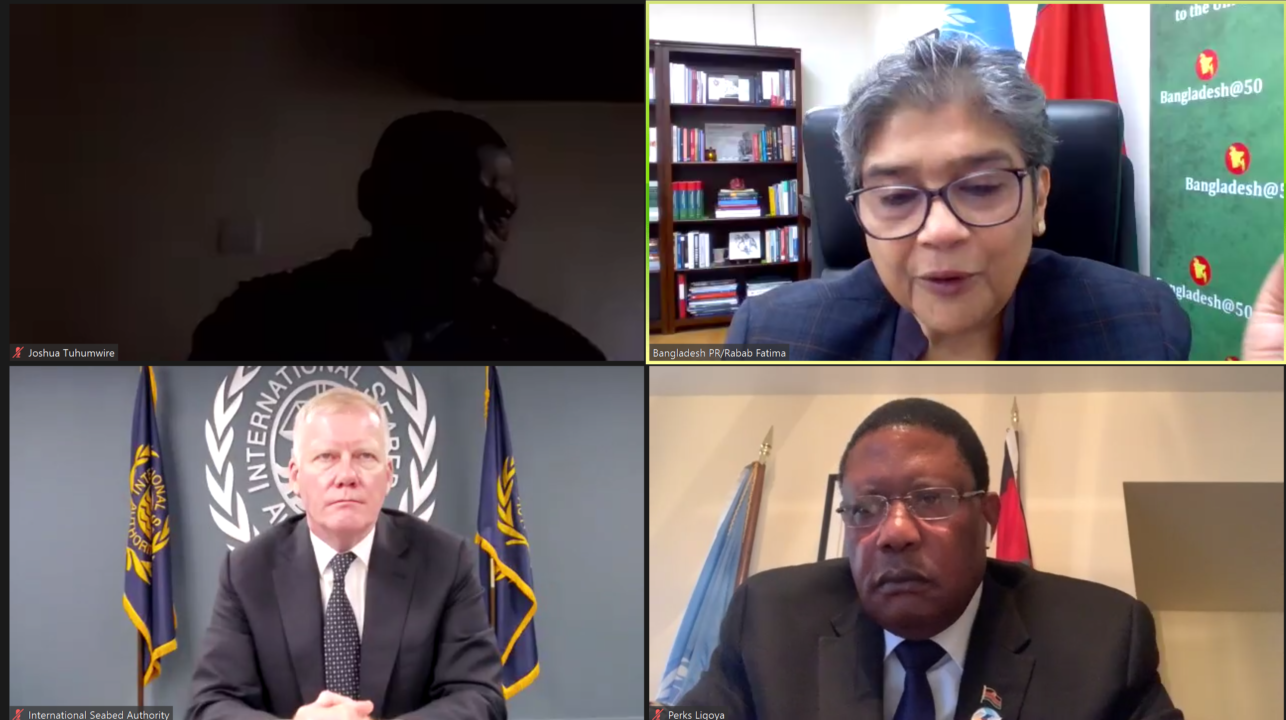Secretary General Michael Lodge, USG Soares, USG Rattray, Excellencies, Distinguished Colleagues.
I thank you, Mr. Secretary General, for inviting me to speak at this important “publication launch” event.
I thank LDC Group Chair, Ambassador Ligoya, for his insightful remarks. I support his call to develop a specific project for LDCs to enable them to harness the benefits of ocean science and deep-sea exploration. Let me to share a few additional thoughts on the LDCs.
Excellencies, Distinguished Colleagues,
Today’s event is very timely. This comes at a time when we have just completed the COP-26 Summit. And we are only 8 weeks away from the LDC5 Conference to be held in Doha.
The draft Doha Program of Action for the LDCs [expected to be adopted at the LDC5 Conference in January] has a dedicated focus on addressing climate change impacts. It encourages an integrated, cross-sectoral, and trans-disciplinary approach to the issues of climate change and oceans.
We are happy to see that the Glasgow Pact also supports this notion of integrity of all ecosystems, including the protection of biodiversity in forests and the ocean.
The ISA with its specialized expertise and knowledge can play a critical role to carry forward this Agenda.
We welcome the focus of its publication: “An Ocean of Opportunity”, on LDCs in critical areas: namely capacity building, technology transfer, marine scientific research, as well as equitable sharing of benefits. These are all very pertinent.
Excellencies, Colleagues,
The LDCs are among the world’s most resource-constraint economies in the world. The Covid-19 pandemic has further exacerbated their pre-existing vulnerabilities. Their decades of socio-economic gains are in serious jeopardy. Extreme poverty in LDCs has increased by 3 percentage points, which pushed 32 million more people to extreme poverty. Average growth in LDCs dropped from 4.8% in 2019 to 1.3% in 2020. The future seems bleaker than ever before.
Against this backdrop, the vast and unexplored resource frontiers of the oceans and seas, especially in the deep sea provide us a huge opportunity to turn this tide. They have the potentials to bring transformative changes to the lives and livelihoods of more than one billion people in the LDCs. Over 80% of the total number of LDCs are states parties to the UNCLOS; i.e. 37 out of the 48 LDCs. And the Convention can indeed be the pathway to an “ocean of opportunity” for them.
We are pleased to see that the ISA Strategic and High-Level Action Plan have recognized the special needs of the LDCs with a particular focus on ensuring their fair share in the deep-sea and marine resources. This can help LDCs in their journey towards achieving the 2030 Agenda and building resilience against current and future shocks.
Let me share a few specific thoughts in this regard:
First, marine scientific research and capacity building are critical for the LDCs. They need enhanced support for capacity building through sharing of knowledge, expertise, and transfer of technology from advanced countries.
The ISA can support enhanced and collaborative research in critical areas for sustainable, inclusive, and resource efficient utilization of ocean resources in the LDCs.
Second, the draft DPOA has identified the devastating impacts of climate change on oceans and seas. Global pollution from chemicals, waste and plastics are seriously disrupting the balance of marine food webs and ecosystems. The SIDs and low-lying coastal states within the LDC group are bearing its heaviest brunt due to the loss of coastal habitats, erosion of land, salinity intrusion etc.
It is imperative to scale up global efforts to tackle the uncontrolled activities in the deep sea, especially in the areas of marine pollutions, illegal and unregulated fishing etc.
Third, the challenges of structural transformation in the LDCs are quite daunting. They need infrastructural investments and access to sophisticated marine technologies for exploration of resources in the high sea.
We appreciate the ongoing work of ISA in facilitating the transfer of marine technology from the developed to developing countries. We encourage them to scale up this effort.
They can enhance their partnership with the UN Technology Bank for LDCs, OHRLLS, UNCTAD and other relevant organizations to facilitate more marine tech-transfers to the LDCs.
Finally, we encourage the ISA to create more space for the women and youth of the LDCs to have enhanced access to the new and emerging opportunities that the activities in the deep-sea, the blue economy can offer.
I thank you all, for this opportunity to share a few thoughts.

